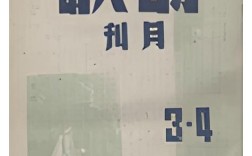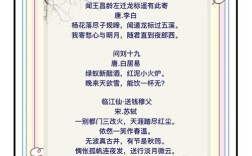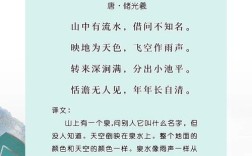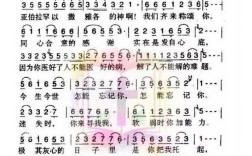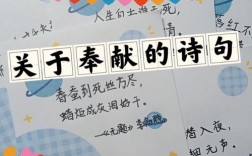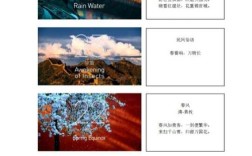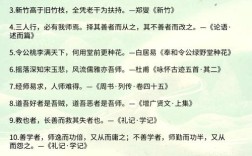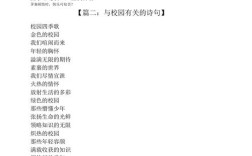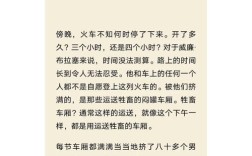关于光阴的诗歌是文学中一个永恒而深邃的主题,它触及了生命、记忆、衰老、希望等核心情感,光阴,既可以是催人老去的无情刻刀,也可以是承载美好回忆的温柔画布。

以下我将为您呈现几个不同风格和角度的经典诗歌,并附上一些赏析,希望能带给您关于“光阴”的深刻感受。
古典诗词:意境悠远,哲思深邃
《长歌行》 - 汉乐府
青青园中葵,朝露待日晞。 阳春布德泽,万物生光辉。 常恐秋节至,焜黄华叶衰。 百川东到海,何时复西归? 少壮不努力,老大徒伤悲!
【赏析】 这首诗是中国古典诗歌中劝人惜时的千古名篇,它用园中朝露易干、春叶秋黄的自然现象,引出“百川东到海,何时复西归”的千古一问,光阴就像这东流的江河,一去而不复返,诗歌前半部分描绘了生命的蓬勃与美好,后半笔锋一转,发出对生命短暂的慨叹和对虚度光阴的警示,充满了朴素而深刻的哲理。
《金缕衣》 - 杜秋娘
劝君莫惜金缕衣,劝君惜取少年时。 花开堪折直须折,莫待无花空折枝。
【赏析】 这首诗用极其凝练的语言,对比了“金缕衣”(财富)和“少年时”(光阴)的价值,它告诉我们,外在的物质财富可以失而复得,但宝贵的光阴一旦流逝,就再也无法挽回,后两句“花开堪折直须折,莫待无花空折枝”更是成为流传千古的警句,将光阴的紧迫与美好描绘得淋漓尽致,充满了对生命及时行乐、把握当下的热情与劝勉。
现代诗歌:意象新颖,情感复杂
《光阴的故事》 - 罗大佑 (歌词)
河边的小村,窗外的青春 有一个清晨,我忽然看见 你的信,写着别人的心情 我的梦,它在哪里呀 多少已凋零
【赏析】 罗大佑的这首歌词,是几代人对青春的共同记忆,它没有直接说“光阴”,而是通过“窗外的青春”、“清晨的信”这些具体的意象,勾勒出一段逝去的、充满懵懂与感伤的时光,光阴在这里,是那个“忽然看见”的瞬间,是信中“别人的心情”,是“多少已凋零”的旧梦,它捕捉了光阴在记忆中留下的痕迹,温暖而又带着一丝怅惘。
《光阴的故事》 - 余光中
让我们来想象一个场景 你坐在窗前,看着窗外 一棵树,从春天到冬天 叶子绿了,又黄了,最后落了 你不知道,这棵树 是你,还是光阴
【赏析】 这是一首意象非常现代的诗,它将“你”与“树”与“光阴”三者重叠,模糊了界限,我们每个人,都像一棵树,在光阴的流转中经历着生命的四季——发芽、繁盛、凋零,当我们回望过去,常常分不清究竟是时间改变了我们,还是我们本身就是时间的见证,这首诗充满了哲思,引人深思个体生命与宏大时间的关系。
外国诗歌:视角独特,意蕴悠长
《Annabel Lee》 - 埃德加·爱伦·坡 (节选)
It was many and many a year ago, In a kingdom by the sea, That a maiden there lived whom you may know By the name of Annabel Lee; And this maiden she lived with no other thought Than to love and be loved by me.
I was a child and she was a child, In this kingdom by the sea, But we loved with a love that was more than love— I and my Annabel Lee—
With a love that the winged seraphs of Heaven Coveted her and me.
And this was the reason that, long ago, In this kingdom by the sea, A wind blew out of a cloud, chilling My beautiful Annabel Lee; So that her highborn kinsmen came And bore her away from me, To shut her up in a sepulchre In this kingdom by the sea.
The angels, not half so happy in Heaven, Went envying her and me— Yes!—that was the reason (as all men know, In this kingdom by the sea) That the wind came out of the cloud by night, Chilling and killing my Annabel Lee.
But our love it was stronger by far than the love Of those who were older than we— Of many far wiser than we— And neither the angels in Heaven above Nor the demons down under the sea Can ever dissever my soul from the soul Of the beautiful Annabel Lee;
For the moon never beams, without bringing me dreams Of the beautiful Annabel Lee; And the stars never rise, but I feel the bright eyes Of the beautiful Annabel Lee; And so, all the night-tide, I lie down by the side Of my darling—my darling—my life and my bride, In her sepulchre there by the sea— In her tomb by the sounding sea.
【赏析】 虽然这首诗的核心是爱情,但光阴是承载这份爱情的唯一容器,诗人反复强调“many and many a year ago”,将故事置于遥远的过去,光阴在这里,是让爱情从鲜活变为回忆的媒介,无论日月星辰如何更迭,时间流逝了多少年,“我”对Annabel Lee的爱却超越了死亡,超越了光阴本身,这首诗展现了人类情感在面对永恒时间时的坚韧与不朽。
《Ozymandias》 - 珀西·比希·雪莱
I met a traveller from an antique land, Who said—"Two vast and trunkless legs of stone Stand in the desert. . . . Near them, on the sand, Half sunk a shattered visage lies, whose frown, And wrinkled lip, and sneer of cold command, Tell that its sculptor well those passions read Which yet survive, stamped on these lifeless things, The hand that mocked them, and the heart that fed; And on the pedestal, these words appear: My name is Ozymandias, King of kings; Look on my Works, ye Mighty, and despair! Nothing beside remains. Round the decay Of that colossal Wreck, boundless and bare The lone and level sands stretch far away."
【赏析】 这首诗是光阴最无情的写照,法老拉美西斯二世(Ozymandias)曾自诩为“万王之王”,他的功绩与雕像本应永世流传,在时间的洪流面前,一切都化为乌有,只剩下一双“trunkless legs”(无头的腿)和一张“shattered visage”(破碎的面具),在荒漠中述说着曾经的辉煌与最终的衰败,光阴在这里,是一位最公正、最冷酷的审判官,它抹平了一切人类自以为的永恒,只留下“boundless and bare / The lone and level sands stretch far away”(空旷荒凉的沙地,向远方无限延伸)的永恒寂静。
光阴,在诗歌中是千变万化的:
- 它是催促(少壮不努力,老大徒伤悲)。
- 它是提醒(花开堪折直须折,莫待无花空折枝)。
- 它是记忆(窗外的青春,多少已凋零)。
- 它是容器,承载着我们所有的爱与痛。
- 它也是毁灭者,将最宏伟的功业化为尘土。
希望这些诗歌能引发您对光阴的共鸣与思考,每一首诗,都是时间在人类心灵上刻下的一道独特印记。

